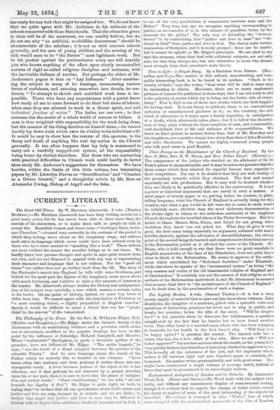CURRENT LITERATURE.
The Good Old Times. By W. Harrison Ainsworth. 3 vols. (Tinsley Brothers.)—Mr. Harrison Ainsworth has been busy writing novels for a good many years, but he has never been able to draw more than the outside of his oharacters, or to make them talk as people do talk in actual life. Beautiful women and brave men—" fortisque Gyas, fortis- quo Cloanthus "—dressed very correctly in the costume of the period to which they belong, move about on the imaginary stage, and address each other in language which never could have been uttered even by those who have come nearest to "speaking like a book." These defects are more evident the nearer the novelist brings us to our times. We hardly know how persons thought and spoke in ages quite remote from our own, and are not disposed to quarrel with any way of representing their character and language that is not tedious. For his "good old times" our anthor'does not go further back than the '45. The story of the Pretender's march into England he tells with some liveliness, and 'indeed for the most part the figures of the imaginary scene move about with much briskness, and contrive to raise a fair amount of interest in the reader. Mr. Ainsworth always studies the history and antiquarian- ism of his subject very carefully, a care which ensures a certain value to his books. On one point of history, indeed, we must beg leave to differ from bins. We cannot agree with his description of Fontenoy as 4‘ a most crushing defeat, — highly prejudicial to English renown." Surely it would be difficult to name a defeat that was less " preju- dicial to the renown" of the vanquished.


































 Previous page
Previous page